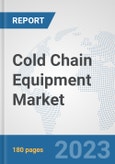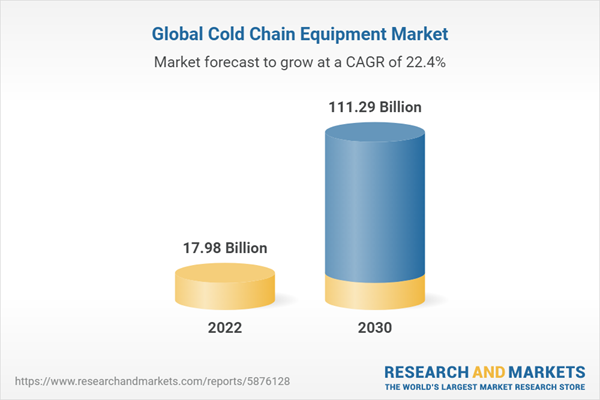The growing demand for protein-rich foods in developing nations has led to an increased focus on expanding the cold chain equipment market. This trend is expected to drive the demand for refrigerated transportation vehicles, which play a crucial role in carrying perishable food items. The cold chain equipment market is projected to expand significantly. Over the past few years, developing nations have witnessed a significant shift towards protein-rich foods, leading to a notable surge in demand for refrigerated transportation. This trend is expected to drive the expansion of the cold chain market. As the need for transporting perishable food items grows, there will be a considerable boost in the cold chain equipment market. To ensure the sustainable growth of the global food processing industry, it is crucial to implement comprehensive supply chain strategies.
Storage equipment, a crucial component of the refrigerated storage industry, dominates the worldwide cold chain equipment market. Its primary function is to safeguard product quality and extend shelf life, making it indispensable in this sector. The equipment category encompasses various types, such as deep freezers, vaccination carriers, and refrigerators. These equipment types can be further classified into on-grid, off-grid, and transportation equipment. The demand for off-grid storage technology is projected to rise significantly, driven by emerging nations' efforts to minimize post-harvest and post-processing food losses. The storage apparatus is specifically designed to maintain a precise temperature range suitable for the type of product being stored. This temperature can vary from below freezing to just above freezing for certain items such as vaccinations, and above freezing for others like fruits and vegetables. Ensuring the quality, safety, and effectiveness of these products throughout the cold chain process is of utmost importance, requiring the use of appropriate storage equipment and temperature control measures.
The Asia Pacific region is home to numerous companies specializing in cold chain equipment solutions. For instance, Haier is a Chinese corporation renowned for its diverse range of refrigerators and freezers, which includes vaccine freezers and medical refrigerators. China plays a substantial role in driving the APAC market, with various factors contributing to its expansion, such as advancements in technology for seafood product packaging, processing, and storage. Driven by increasing demand and expanding infrastructure, China has emerged as a leading market for cold chains. The country's economy is undergoing a rapid transformation, transitioning from an industry and construction-driven model to a consumer-driven one. Consequently, there is a growing need for cold chain solutions, particularly in China's thriving pharmaceutical industry, which is experiencing significant advancements. The rapid growth of the biopharmaceutical sector in the region further amplifies the impact on the industry's demand for cold chain solutions.
Report Findings
1) Drivers
- The market experiences significant growth due to increasing consumer demand for processed food. The cold chain equipment plays a vital role in the food and beverage industry.
- The market experiences significant growth due to the positive impact of food safety and quality regulations on the industry.
2) Restraints
- The cold chain in food has global and environmental climate change hamper the growth of the market.
3) Opportunities
- The market presents growth opportunities through the emergence of innovative and sustainable technologies in emerging markets.
Research Methodology
A) Primary Research
The primary research involves extensive interviews and analysis of the opinions provided by the primary respondents. The primary research starts with identifying and approaching the primary respondents.The primary respondents are approached include
1. Key Opinion Leaders2. Internal and External subject matter experts
3. Professionals and participants from the industry
The primary research respondents typically include
1. Executives working with leading companies in the market under review2. Product/brand/marketing managers
3. CXO level executives
4. Regional/zonal/country managers
5. Vice President level executives.
B) Secondary Research
Secondary research involves extensive exploring through the secondary sources of information available in both the public domain and paid sources. Each research study is based on over 500 hours of secondary research accompanied by primary research. The information obtained through the secondary sources is validated through the crosscheck on various data sources.The secondary sources of the data typically include
1. Company reports and publications2. Government/institutional publications
3. Trade and associations journals
4. Databases such as WTO, OECD, World Bank, and among others.
5. Websites and publications by research agencies
Segment Covered
The global cold chain equipment market is segmented on the basis of type, and application.The Global Cold Chain Equipment Market by Type
- Storage Equipment
- Transportation Equipment
The Global Cold Chain Equipment Market by Application
- Dairy and Frozen Desserts
- Bakery and Confectionary
- Processed Food
- Pharmaceuticals
- Vegetables and Fruits
Company Profiles
The companies covered in the report include- Carrier
- Intertecnica
- ebm-papst
- INCOLD S.P.A
- Kason Industries, Inc.
- CHG Europe BV
- Kelvion Holding GmbH
- Schmitz Cargobull
- Rivacold srl
- CAREL INDUSTRIES S.p.A.
What does this Report Deliver?
1. Comprehensive analysis of the global as well as regional markets of the cold chain equipment market.2. Complete coverage of all the segments in the cold chain equipment market to analyze the trends, developments in the global market and forecast of market size up to 2030.
3. Comprehensive analysis of the companies operating in the global cold chain equipment market. The company profile includes analysis of product portfolio, revenue, SWOT analysis and latest developments of the company.
4. Growth Matrix presents an analysis of the product segments and geographies that market players should focus to invest, consolidate, expand and/or diversify.
Table of Contents
Companies Mentioned
- Carrier
- Intertecnica
- ebm-papst
- INCOLD S.P.A
- Kason Industries, Inc.
- CHG Europe BV
- Kelvion Holding GmbH
- Schmitz Cargobull
- Rivacold srl
- CAREL INDUSTRIES S.p.A.
Table Information
| Report Attribute | Details |
|---|---|
| No. of Pages | 180 |
| Published | August 2023 |
| Forecast Period | 2022 - 2030 |
| Estimated Market Value in 2022 | 17.98 Billion |
| Forecasted Market Value by 2030 | 111.29 Billion |
| Compound Annual Growth Rate | 22.4% |
| Regions Covered | Global |
| No. of Companies Mentioned | 10 |









